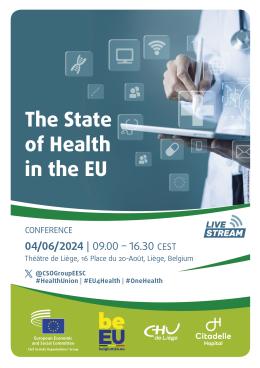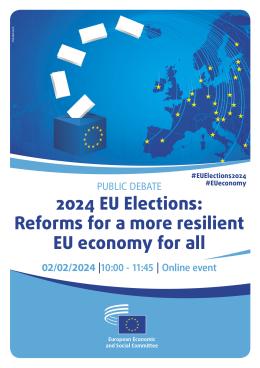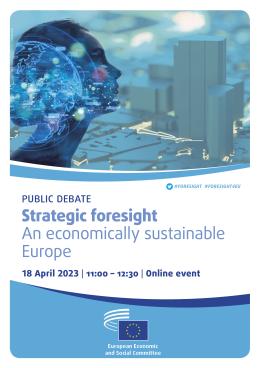European Economic
and Social Committee
Main navigation
-
O nás
ABOUT
The European Economic and Social Committee (EESC) is the voice of organised civil society in Europe.
Find out more about its role and structure at http://www.eesc.europa.eu/en/about
- Politické uspořádání
- Administrativní uspořádání
- SPOLUPRÁCE S OSTATNÍMI ORGÁNY A INSTITUCEMI
- Rules
-
Co děláme
OUR WORK
The EESC issues between 160 and 190 opinions and information reports a year.
It also organises several annual initiatives and events with a focus on civil society and citizens’ participation such as the Civil Society Prize, the Civil Society Days, the Your Europe, Your Say youth plenary and the ECI Day.
Find the latest EESC opinions and publications at http://www.eesc.europa.eu/en/our-work/opinions-information-reports/opinions and http://www.eesc.europa.eu/en/our-work/publications-other-work/publications respectively.
- Stanoviska a informační zprávy
- Dokumenty
- Publikace a další práce
-
Občanská společnost a zapojení občanů
- Civil Society Week
- European elections 2024
- Cena pro občanskou společnost
- The Conference on the Future of Europe
- Evropský demokratický pas
- Vaše Evropa, váš názor
- Evropská občanská iniciativa
- The path to our industrial future
- Youth Climate and Sustainability Round Tables
- EU Organic Awards
- Civil Society Against COVID 19
- EESC stands with Ukraine
- Partnerships
- Relations with ESCs
-
Politiky
POLICIES
The EESC is active in a wide range of areas, from social affairs to economy, energy and sustainability.
Learn more about our policy areas and policy highlights at http://www.eesc.europa.eu/en/policies
-
Oblasti politiky
- Zemědělství, rozvoj venkova a rybolov
- Opatření v oblasti klimatu
- Politika soudržnosti a regionální a městská politika
- Spotřebitelé
- Digitalizace a informační společnost
- Hospodářská a měnová unie
- Vzdělávání a odborná příprava
- Zaměstnanost
- Energetika
- Podnikání
- Životní prostředí
- Vnější vztahy
- Finanční služby a kapitálové trhy
- Základní práva a práva občanů
- Housing
- Průmysl a průmyslové změny
- Institucionální záležitosti a rozpočet EU
- Migrace a azyl
- Výzkum a inovace
- Služby obecného zájmu
- Jednotný trh
- Sociální věci
- Udržitelný rozvoj
- Daňový systém
- Doprava
-
Oblasti politiky
-
Program
AGENDA
The EESC holds nine plenary sessions per year. It also organises many conferences, public hearings and high-level debates related to its work.
Find out more about our upcoming events at http://www.eesc.europa.eu/en/agenda/our-events/upcoming-events
- Akce EHSV
-
Aktuality a média
NEWS & MEDIA
Here you can find news and information about the EESC'swork, including its social media accounts, the EESC Info newsletter, photo galleries and videos.
Read the latest EESC news http://www.eesc.europa.eu/en/news-media/news and press releases http://www.eesc.europa.eu/en/news-media/press-releases
- President
-
Členové a skupiny
MEMBERS & GROUPS
The EESC brings together representatives from all areas of organised civil society, who give their independent advice on EU policies and legislation. The EESC's326 Members are organised into three groups: Employers, Workers and Various Interests.
Find out more about our Members and groups at http://www.eesc.europa.eu/en/members-groups
- Členové
- Skupiny
-
Specializované sekce a další orgány
SECTIONS & OTHER BODIES
The EESC has six sections, specialising in concrete topics of relevance to the citizens of the European Union, ranging from social to economic affairs, energy, environment, external relations or the internal market.
Find out more at http://www.eesc.europa.eu/en/sections-other-bodies
-
Specializované sekce / komise
- Hospodářská a měnová unie, hospodářská a sociální soudržnost (ECO)
- Jednotný trh, výroba a spotřeba (INT)
- Doprava, energetika, infrastruktura a informační společnost (TEN)
- Zaměstnanost, sociální věci, občanství (SOC)
- Zemědělství, rozvoj venkova, životní prostředí (NAT)
- Vnější vztahy (REX)
- Poradní komise pro průmyslové změny (CCMI)
- Střediska pro sledování
- Ostatní
-
Specializované sekce / komise
- Ukraine
















